Is Facial Acupuncture the new Botox?
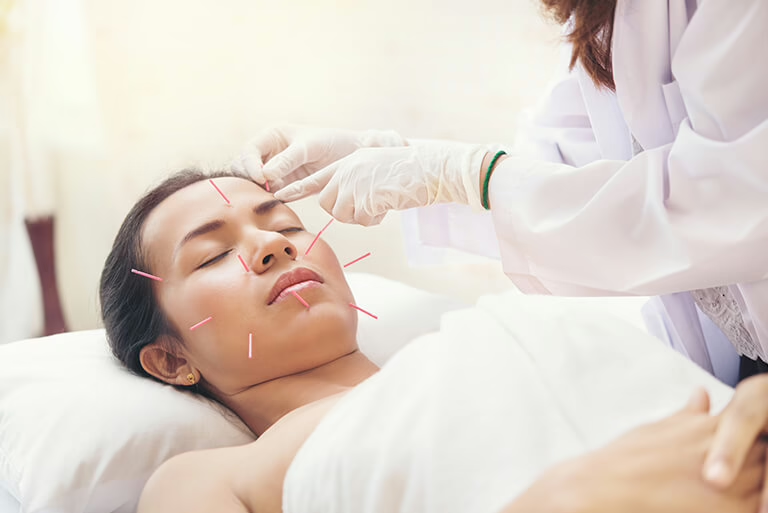
Is Facial Acupuncture the new Botox? Link copied! Rejuvenating your skin and wellness naturally with Facial Acupuncture! A mere mention of acupuncture often makes people scrunch their face in anticipated pain, what more when you tell them that you will poke acupuncture needles into their face! While there has been a recent resurgence of interest in Facial Acupuncture, it has a long history. Before the Warring States period in Chinese history (475- 221 BC), acupuncture treatments for cosmetic purposes were mostly a luxury, generally reserved for the Empress and the Imperial concubines for their beauty, health and longevity. 1 More recent research points to the efficacy of Facial Acupuncture for aesthetic results. A 1996 report in the International Journal of Clinical Acupuncture reported that in 300 cases treated in China with cosmetic Facial Acupuncture, 90% reported marked effects with just one course of treatment. The effects included improvement in skin texture and colouring, increased elasticity, reduction of wrinkles and overall rejuvenation (not merely confined to the face). 2 However, acupuncture is not used to treat beauty concerns singularly because it is believed in Traditional Chinese Medicine (TCM) that beauty originates from inside out, given the strong relationship between health and appearance. From the TCM perspective, many meridians either start or end on the face or some have branches that go to the face, correlating the relationship of health and appearance. 3 For example, facial skin pigmentation is often associated with poor Qi and blood flow to the facial region. Hence, acupuncture can be applied to selected acupoints away from the face which in turn helps relieve the pigmentation. What exactly is Facial Acupuncture and how does it help your skin? Facial Acupuncture involves inserting thin and disposable acupuncture needles into specific points on the face, head and neck. This is usually for aesthetic purposes with a focus on facial anti-ageing and facial rejuvenation. Collagen is the protein responsible for tightness and vibrancy in the skin. Its production slows down as we age, which can lead to fine lines, wrinkles and a decline in elasticity in our skin. The act of needling into the skin causes positive micro-trauma to the skin which encourages blood flow and collagen production, leading to the treatment and prevention of the signs of ageing. The improved localized blood supply helps to strengthen and tighten the facial tissues for a glowing complexion. 4 [Facial Acupuncture] reduces the sign of aging by revitalizing the skin, brings youthful glow and cultivates Qi circulation, increase in blood flow, production of collagen & elastin, balances Qi, balancing internal zang fu organs. It enhances radiance of complexion rejuvenation for body, reduce stress, promote overall health & well-being diminish fine lines & wrinkles, age spots, decrease dark circles/bags, increases moisture decrease puffiness of entire face and under eyes, increases in facial muscle tone balances hormones, clears acne and hormonal acne, tightens pores, improves elasticity of facial muscles” — Lisa LaCova-Bhat, President of Lmar Integrative Holistic Medicine & Anti-Aging Therapies, Inc, USA How does Facial Acupuncture help with your wellness? In TCM, the body system is seen as a whole, and skin problems often reflect disharmony in the body. Facial Acupuncture aims to improve the body’s constitution and create balance in the internal environment of the body to bring out better complexion from within. Thus, other than stimulating acupoints on the face, related acupoints on other parts of the body, such as hands and legs, are also utilized. This will help to address the underlying root cause of the problem. The specific acupoints are chosen depending on the underlying health imbalances of the individual and their specific ageing concerns. According to the Yellow Emperor’s Classic of Internal Medicine reportedly written by a famous Chinese emperor around 2600 BC (Huang Di Nei Jing), the complexion, hair and skin are related to the state of the internal zang fu organs. [3] Specifically, the hair is governed by the kidneys and the skin is governed by the lungs. This medical classic also explores the relationship between diet, health, and appearance and has dietary recommendations for food and Chinese herbs. Unlike Western facial treatments, Facial Acupuncture is often not a quick fix. It is a customized treatment based on the body’s overall condition and offers a holistic approach to managing skin problems. This will help to create long term changes to the skin and body health, such as a brightened skin tone, reduced dark eye rings and improved skin elasticity leading to a sharper jawline. Similar to acupuncture, the common side effects of Facial Acupuncture is light bruising which happens in about 1 out of 5 sessions. It is almost a zero-downtime facial treatment as compared to other more invasive treatments. Who is Facial Acupuncture suitable for? Facial Acupuncture is safe for most healthy individuals. However, for people with skin infections, open wounds, tumours, bleeding disorders, serious health conditions and acute diseases, it is best to seek a consultation with our Physicians before embarking on Facial Acupuncture. In cases of severe acne, the session will be focused more on acupoints on the body rather than the face. What does a complete Facial Acupuncture treatment plan look like? A suggested treatment plan will be 10 sessions, 1-2 times a week, to see optimum results. After that, depending on the body’s condition, one can get a session every 2-4 weeks to maintain the results. Your beauty and wellness is the most important In Oriental Remedies Group, we have more than 10 certified bi-lingual TCM Physicians. Each of them has been trained in Nanyang Technological University (Singapore) and China for a minimum of 5-8 years, in both Biomedical Science and TCM before being certified to practice in Singapore. Specifically, we have Physician Poh who specializes in female beauty and infertility. After knowing all the benefits of Facial Acupuncture, are you ready to book a session with us and get the glow back to your skin? Please contact us at +65 8087 0486 for a personalized consultation. This article is written by Senior Physician Julie Low. Oriental Remedies Group, with contribution from Wellness Blogger Beatrice
Forget me not… TCM support for Dementia
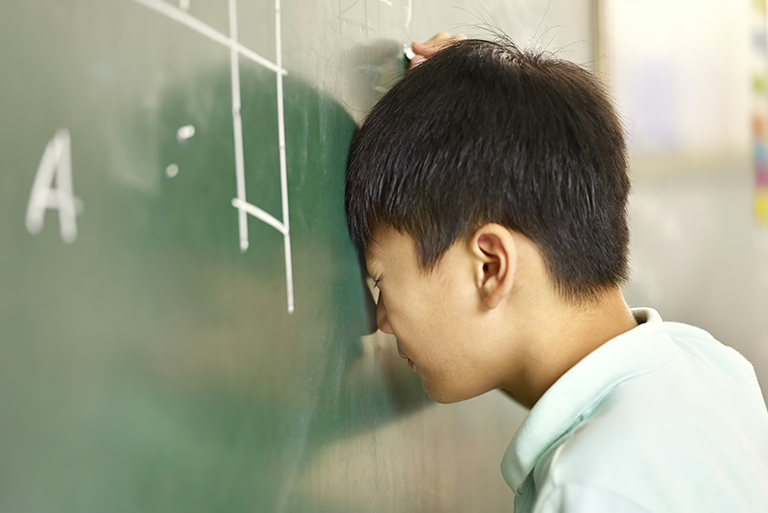
Forget me not… TCM support for Dementia Link copied! What is dementia and how does it affect you? Dementia is a disease of the brain that causes damage to the brain cells and causes the affected person to lose their memory and other cognitive skills. This can affect their ability to carry out everyday activities and may cause changes to their behaviour, mood and personality. Therefore, it can be emotionally distressing when a family member or you gets diagnosed with dementia. It gets even more distressing and taxing as the disease progresses, with the patient often requiring care for the simple things we take for granted like having a meal or going to the toilet. There are many types of dementia such as Alzheimer’s Disease, Vascular Dementia, Lewy Body Dementia, Frontotemporal Dementia, etc. However, the two most common types are Alzheimer’s Disease and Vascular Dementia. The cause of Alzheimer’s Disease is unknown but can be partly attributed to genes causing production and deposition of beta-amyloid plaques that can damage brain cells. Meanwhile, Vascular Dementia is most often caused by multiple small strokes that usually occur over several years. Causes of dementia from the TCM perspective From the TCM perspective, dementia can be caused by the following: 1) Lack of marrow in the brain Ageing or chronic illnesses can deplete the brain marrow, causing lack of nourishment to the brain. This can lead to degeneration which results in problems with memory and thinking skills. 2) Qi and blood deficiency Lack of qi and blood, which arises from chronic illnesses or a weak digestive system, can reduce blood flow to the Heart (which governs emotions and thoughts from the TCM perspective). This results in the manifestation of emotional problems and psychiatric conditions such as agitation or anxiety. 3) Kidney essence deficiency Kidney essence deficiency from old age and chronic illnesses can reduce the amount of essence that is being sent up to the brain to be stored as marrow for the nourishment of the brain. 4) Blood stasis and phlegm accumulation These toxins can block the flow of qi and blood to the brain. Furthermore, blood stasis and phlegm can develop fire or heat in the body over time, which can disrupt proper brain functioning. How can TCM help to cope with dementia? As the population ages, the number of people living with dementia has been on the rise. Conventional Western medicine can help to delay the speed of disease progression, but only for a limited period of time. Patients may develop side effects to these western drugs and some may even find it intolerable. Hence, over the years, there has been an increasing trend of dementia patients turning to TCM for dementia support worldwide. Patients and caregivers usually seek TCM to help cope with the variety of symptoms as dementia progresses, such as memory loss, attention problems, depression and anxiety. TCM is also used to help patients cope with the side effects from medication, such as nausea, poor appetite, constipation and headache. There are many clinical studies that show that TCM is effective in supporting treatments against dementia. TCM herbal medicine and acupuncture have been effectively used in clinical settings to help slow down the progression of the disease and in some cases improve the cognitive functions and ability of patients to do everyday activities. 1-4 For patients who are unable to handle the side effects from their medication or patients who have reached the advanced stage of dementia where conventional drugs can no longer produce meaningful changes in memory or behaviour, TCM can play a dominant role to help improve the quality of life and reduce social and economic burdens of the patient and their family. Research has shown that TCM can reduce the need for special nursing care and medical expenses. Past studies revealed that integrated TCM therapies can reduce the risk of urinary catheterization for people who have difficulty emptying their bladder due to weakness of bladder muscles[5] and reduce the risk of pneumonia among dementia patients who have difficulty in swallowing. 6,7 How can we help dementia patients at Oriental Remedies Group? Here at Oriental Remedies, we believe in tapping into both Traditional Chinese Medicine and Technology-Enhanced Therapies to help patients with dementia by leveraging on the scientific knowledge of our body’s physiology. As dementia is a complicated and multi-faceted issue, the synergistic combination of both treatments tends to produce better outcomes for patients with dementia. Acupuncture Acupuncture involves inserting very fine needles into specific points along the meridians to stimulate the flow of Qi in our body. Specifically, there is a special Meridian, Du Mai, which runs along the head and enters our brain. Several points on the Du Mai, as well as specific points on our head, can be used to improve cognitive functions. Acupoints Baihui (GV 20), Sishencong (EX-HN1) and Shenting (GV 24) are commonly used points with high clinical efficacy, especially so for acupoint Baihui (GV 20). Research has shown that GV 20 exerts its therapeutic effects by increasing dopamine levels. [8] Dopamine serves various important functions. Its functions include acting as a neurotransmitter and being a key regulator in synaptic plasticity, playing a key role in the transmission of signals in our brain. In addition, GV 20, together with Zusanli (ST 36), also preserves the integrity of our Blood-Brain Barrier (BBB) and reduce permeability. 8 Herbal Medication & Dietary Changes There are several herbs in TCM that are used to boost memory and cognitive functions. They are also used to manage behavioral and psychological symptoms associated with dementia. The most commonly used herbs for dementia patients include Thinleaf milkwort (远志), Ginseng(人参), Poria(茯苓), Chinese Angelica(当归) and Prepared rehmannia root(熟地). From the TCM perspective, Thinleaf milkwort can anchor the mind, dispel phlegm, and reduce swelling. Ginseng tonifies Qi, strengthens the immunity and tranquilizes the mind. Poria induces diuresis to drain dampness, invigorates the spleen function, and calms the mind. Chinese Angelica tonifies and activates blood, regulate menstruation, relieve pain, moisten the intestines and relaxes bowels. Prepared rehmannia root nourishes yin and replenishes blood, as well as reinforcing essence and marrow. There are numerous animals and in-vitro studies that indicate these herbs can elicit memory-cultivating effects through mechanisms such as eliciting
What can TCM do for Patients with Stroke?
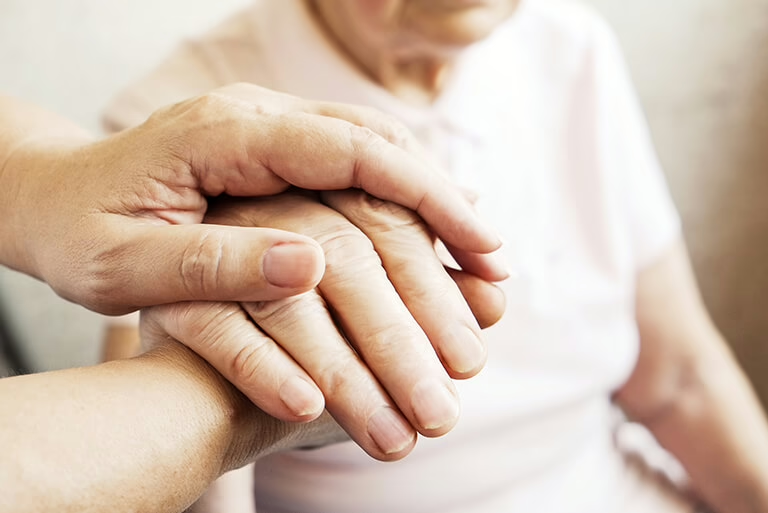
What can TCM do for Patients with Stroke? Link copied! Stroke is deadly and dreadful Stroke remains the fourth leading cause of death in Singapore and is one of the top contributors of adult disability – 63% of stroke patients have some disability within three months. The silent and deadly nature of stroke, as well as the resulting long-term disability, makes it one of the most dreadful illnesses which everyone fears. Traditional Chinese Medicine (TCM) has been used for many centuries and is still widely used today in many countries (especially south and east Asia) for the treatment and prevention of stroke, complementing conventional western medical care. However, most people are still unaware of the benefits that TCM can offer in the long, arduous process of stroke rehabilitation. This article hopes to shed light on how TCM views stroke, the types of TCM treatments and their benefits in stroke recovery. What is stroke? From a biomedical perspective, stroke occurs when blood supply to the brain is interrupted. This causes brain cells to lose their function, thus leading to the signs and symptoms commonly observed. There are two main types of stroke: Ischaemic stroke occurs due to blockage of the blood vessel, limiting blood flow to the brain. It is the most common type, accounting for 74% of strokes in Singapore. Hemorrhagic stroke occurs due to rupture of a blood vessel, causing bleeding into the brain. This makes up 24% of strokes in Singapore. Please note: all words in Italics mentioned henceforth refer to the TCM organ-system and not the anatomical organ referenced in western medicine. Meanwhile, in TCM theory, stroke is more than just an illness of the brain as it affects the meridians and other organs as well. From TCM perspective, stroke has been thought to be caused by internal and external influences, resulting in disrupted and unsettled flow of Qi and blood in the body which ultimately rush upwards to the head. Knowing and understanding the internal and external factors contributing to the development of stroke enables one to take precautionary actions to reduce the risk of stroke occurrence. Early identification and intervention for stroke It is well-established that timely intervention at the onset of acute stroke is crucial as more brain tissues can be rescued. This translates into saving body functions and better quality of life for the patient in the long run. Therefore, being aware of stroke symptoms and seeking immediate treatment by calling the ambulance is life-saving knowledge which everyone should know. Common symptoms of stroke include: Sudden weakness or numbness of the face, arm or leg, especially on one side of the body Sudden slurring of speech Sudden trouble walking, dizziness, loss of balance or incoordination Sudden severe headache with no known cause Sudden trouble seeing in one or both eyes Stroke prevention from TCM perspective There are two aspects in prevention – fresh occurrence (people who did not have a stroke before) and reoccurrence (people who experienced stroke before). Among the TCM community, it is generally accepted that the five TCM entities associated with stroke are Wind (风), Fire (火), Phlegm (痰), Stagnation/Stasis (瘀) and Deficiency (虚) respectively. The concept of what each entity encompasses and what should be done to mitigate these deficiency, excess, stagnation and imbalance are detailed as below: 1) Deficiency This internal risk factor arises due to Yin deficiency of the Liver and Kidney. As the human body ages, Liver and Kidney Yin decreases (ageing is something that one cannot change). Although natural ageing is non-modifiable, we can cultivate healthy habits to help conserve the Liver and Kidney Yin, such as: Sleeping early at night (before 11 pm) Having sufficient rest by not overworking (long hours under stressful conditions) Eat Yin nourishing food such as deep, green leafy vegetables, cucumber, celery, millet, eggs and fish Avoid fried, grilled food which causes heat and exhausts Yin 2) Fire (Heat) Yin deficiency results in the production of heat that damages Yin, further aggravating Yin deficiency in the body. Late-night sleep and prolonged extremes of emotions such as anger, frustration and stress bring about fire in the Heart and Liver. If left untreated, this pathogenic fire (imbalance in the body) within the body will deplete Yin to an extent of generating Liver Yang and subsequently Liver Wind which predisposes one to stroke. Some simple ways to mitigate the level of heat in the body: Adopting a regular diet of heat clearing food such as lotus seeds and lily bulbs Sleeping early Maintaining a positive and cheerful mindset 3) Phlegm Like Wind, Phlegm is also a TCM pathogenic factor produced in the body and causes many diseases. Eating irregularly or ingesting excess dairy products, rich, fatty and sweet food weakens the Spleen and leads to the production of Phlegm, which predisposes the body to obesity. In TCM theory, Phlegm causes numbness in the extremities, mental clouding, slurred speech or aphasia, and a swollen tongue with a sticky coating. Extreme physical work, including excessive exercise and sports, also weakens the Spleen and can lead to Spleen deficiency, which in turn causes Phlegm. 4) Stagnation/Stasis Qi stagnation can result from either Qi deficiency or stress. Stagnation, in turn, causes Blood stasis which affects the meridians and joints, causing stiffness and pain in the extremities which are commonly experienced by stroke patients. By exercising, keeping active and doing activities which relieve stress, Qi stagnation can improve. Having adequate rest and a well-balanced diet also helps to alleviate Qi deficiency. 5) Wind Wind must not be taken literally as what we feel in the natural environment. In TCM, there is External Wind and Internal Wind. It is believed that Wind causes the sudden loss of self-awareness in an acute stroke attack, and its subsequent hemiplegia. Liver Yang is formed as a result of severe Liver and Kidney Yin deficiency. This Liver Yang will subsequently induce Liver Wind (Internal Wind) which is a causative agent of stroke, coma, mental clouding and paralysis. Internal and External Wind can interact because the second can shape the first. To quell the formation of Internal Wind, it is important to recognize there are different types of Internal Wind which must be differentiated and dealt with accordingly in clinical practice. The most pertinent categories of differentiation of Internal Wind theory are Heat, Phlegm and Qi deficiency. Post-stroke rehabilitation Besides undergoing the standard care pathway for stroke defined by western doctors, patients can also receive TCM treatment as a complementary form of support to maximize recovery. It is noteworthy that treatments such as acupuncture should be carried out as frequently as three times per week during the first three months after experiencing a stroke.
Insomnia – Don’t sleep on your sleep disorder

Insomnia – Don’t sleep on your sleep disorder Link copied! Insomnia is a real and rising problem plaguing populations all over the world. A sleep survey done in 2016 revealed that the average Singaporean sleeps just slightly over 7 hours a day, and compared to other countries surveyed, Singaporeans sleep at a later hour at around 11.45pm. Globally, about 6 in 10 adults have sleep-related issues, with about 26% facing insomnia. Amongst these people, 60% face disrupted sleep due to worrying, primarily overwork, financial or economic issues. Moreover, the percentage of time in the deep sleep stage decreases with age due to various factors like stress, pain, illness and medical problems. [1] If this sounds like you, read on! Singaporeans are one of the most sleep-deprived people in the world!! Source: statista.com / Science Advances What exactly is insomnia and why should we treat it? So what exactly is insomnia? Insomnia is the complaint of inadequate or poor-quality sleep that interferes with normal daytime functioning. Some people may think that insomnia is mere difficulty falling asleep, but so long as you are feeling too tired the next day for your daily activities, you should consider other forms of insomnia you may have – waking up in the middle of the night with problems falling back to sleep or waking up too early in the morning. [2] Such poor quality sleep often leaves people feeling unrefreshed, lethargic, or groggy when they wake up in the morning. Many people have disregarded their sleep quality or the lack of sufficient hours, failing to realize the health implications that come with sleep deficiency. The short term effects of insomnia include poor concentration, stiff neck, changes in appetite, mood swings, headaches etc. Poor sleep quality over a prolonged period will lead to lower immune system and poor mental health function, and this combination may have dire consequences on our health potentially leading to cancers, diabetes, hypertension and hormonal imbalances. [3] Short term insomnia, when neglected, can easily become chronic insomnia, which is characterized by more than a month of inadequate sleep. Once chronic insomnia develops, it will be more difficult to manage and restored back to normal. How can we help deal with Insomnia here at Oriental Remedies Group? Earlier on, we have shared lifestyle habits to avoid – 3 Mistakes You Are Committing That Prevent You From Having A Good Night’s Sleep to help you achieve better sleep. One of the natural remedies includes our concoction of Qi Stagnation Calming Tea to help alleviate sleep disorders such as Insomnia. Here, we will be sharing how Insomnia can be treated using a conventional TCM approach, as well as with our Technology-Enhanced Therapies uniquely found here at Oriental Remedies. The approach that TCM uses to treat insomnia is through regular acupuncture and herbal medication. Herbal Medication & Dietary Changes Liver, heart, spleen and kidney are the key organs that we need to regulate. Symptoms like dizziness, migraines, fatigue, and forgetfulness are all symptoms associated with liver yin deficiency, liver and heart fire, spleen and kidney deficiency. Other than identifying and treating the root cause of insomnia, the use of herbs like 黄芩Scutellaria baicalensis、茯神Poria cocos、肉桂Chinese cinnamon etc in the prescribed herbal medications can also treat some symptoms associated with insomnia like migraines, bad breath, poor digestion and obesity. Acupuncture By stimulating acupoints like 太溪、三阴交 etc. that can boost the liver and kidney energy, regular sessions of acupuncture can help in restoring and re-balancing the yin and yang energies essential for boosting the quality of sleep. Due to the wide spectrum of symptoms and conditions that can be caused by insomnia, it is always more beneficial to combine both acupuncture and herbal medicine in the treatment of insomnia. Besides traditional TCM treatments, Oriental Remedies Group also offers Technology-Enhanced Therapies to enhance overall health in patients. Electro-Lymphatic Therapy (ELT) Electro-Lymphatic Drainage Therapy (ELT) is a gentle and non-invasive therapy that helps to stimulate proper flow and drainage of the lymphatic system, simulating the effects of a lymphatic drainage massage or tuina without the pain and pressure. According to research, the loss of sleep, even for a few short hours during the night, can prompt one’s immune system to turn against healthy tissue and organs. Thus, in people with chronic insomnia, there exists tissue-damaging inflammation in the organs that in the long run, may lead to cardiovascular diseases, diabetes, and cancer. With good lymphatic drainage, immune cells can be brought within the lymph fluids to clear damaged cells like inflammatory mediators. By combining TCM treatments with such Technology-Enhanced Therapies, we aim to achieve overall well-being and help achieve better quality sleep. Your healing is the most important! In Oriental Remedies Group, we have more than 10 certified bilingual TCM Physicians. Each of them has been trained in both Nanyang Technological University (Singapore) and China for a minimum of 5-8 years, in both Biomedical Science and TCM before being certified to practice in Singapore. Specifically, we have Physician Ng Mei Yun who specializes in treating insomnia and diabetes, to name a few. Insomnia is so common that many around us often overlook this issue. Action has to be taken fast to correct this disorder through lifestyle changes and early treatments. When the problem becomes chronic, your body is unable to easily get back to its proper sleep cycle and will need stronger actions to be taken to address your sleep disorder. Treatment progress may become longer and more complicated. If you suffer from Insomnia or knows of anyone who do, take action now to get it resolved! Do not sleep on it! Please contact us at +65 8087 0486 for a personalized consultation. This article is written by Senior Physician Ng Mei Yun, with contributions from Senior Therapist Hannie Hong. Disclaimer: The information on this page is for information and educational purposes only. Such medical information may relate to disease, injury, drugs and other treatments, medical devices and/or health products. Medical information does not amount to advice, and if advice is needed an appropriate professional help should be sought. The disclaimer asserts that no warranties or
How does TCM help men during IVF?

Link copied! So much of fertility and related support is focused on the female and very few males seek out TCM support. On top of that, a trip to the fertility specialist might leave male patients feeling flustered and confused – What do the abbreviations like PR, NP, IM in a semen examination report mean? Terms like low motility, low volume and low concentration might be uttered by the doctor. Does this experience seem familiar to you? We have previously discussed ways to improve fertility, and in this article, we will zoom in specifically into providing support to men going through IVF and outline how TCM can help the male patient in your IVF journey. Note: All words in Italics refer to the TCM organ-system or TCM terminology and not the anatomical organ referenced in western medicine. What is IVF? IVF (In-vitro fertilization) is a kind of ART (Assisted-reproduction therapy) commonly used today to help couples conceive when natural methods fail. There are 4 generations of IVF in the world today: IVF-ET (In-vitro fertilization-embryo transfer) ICSI (Intracytoplasmic sperm injection) PGD/PGS (Preimplantation Genetic Diagnosis/Preimplantation genetic screening) GVT (Germinal vesicle transfer) In Singapore, the first 2 procedures are often done. Between PGS and PGD, only PGD is done in Singapore if either parent has a family member with a genetic condition to prevent said hereditary disease from being passed down to the future child. Due to issues concerning medical ethics, GVT is currently not being done in Singapore. Who requires IVF? Men undergoing IVF usually have one or several issues associated with: Semen quality Poor sperm motility (asthenozoospermia) means that the sperm do not swim properly. Sperm morphology refers to the size and shape of the sperm in a given semen sample. You want at least 4% of sperm to be a normal shape. Otherwise, you could have fertility problems because of abnormal sperm morphology Semen quantity Sexual function Typical semen analysis results for to-be IVF candidates: Poor motility in their sperm sample – Grade A sperm lower than 25% or Grade A+B lower than 32% Sperms lower than 4% normal morphology Diminished sperm concentration – between 10 x 106 to 15 x 106 sperm/ml In couples who have had recurrent miscarriages, failure to conceive despite having near to normal sperm parameters or if both parties have normal parameters [1], the male would be recommended to undergo testing for sperm DNA fragmentation or DFI (DNA fragmentation index). There are many ways and methods by which DFI is measured but it is usually presented as a percentage. A person with DFI value above 30% is thought to be a viable candidate for ICSI. [2] A major cause of high DFI values are excessive oxidative stress caused by ageing, improper lifestyle choices, or exposure to chemicals and radiation. [3] DFI testing is not done routinely in a semen analysis yet. However, from our observations over the years, high DFI values can result in recurrent miscarriages and be the missing piece to explain increasing infertility whereby a cause cannot be found in either party. Typical DFI readings Source: www.researchgate.net After proper diagnosis, men with moderate to severe reduction in sperm concentration also known as Oligozoospermia, ICSI will be the better choice to increase the chance of fertilization. ICSI involves the insemination of an ovum from the female using just one sperm chosen from the semen sample from the male. This is done using a special needle which can penetrate the zona pellucida and insert a sperm directly without the sperm having to push its way through the Zona pellucida – a thick transparent membrane surrounding the ovum. ICSI involves the insemination of an ovum from the female using just one sperm chosen from the semen sample from the male. Source: www.researchgate.net How can men prepare for IVF Having to watch one’s female partner endure IVF can be a stressful period for the male. The procedure is costly and puts a physiological, emotional, psychological and financial toll on the couple. In addition, the female has to undergo painful self-injections during the ovarian stimulation period which can result in her experiencing severe mood swings. As a result, there is a change in family dynamics and the male might feel guilty for putting their wife through such a gruelling ordeal especially if the fertility issue was not hers to begin with. It is important for the male to prepare mentally to manage these stresses to prepare adequately for IVF. If the male is overweight, it is also necessary for him to control his diet so as to reduce the amount of visceral fat which can disrupt the balance of endocrine hormones in the body. [4] Additionally, TCM views lifestyle habits like smoking, drinking, improper diet or eating habits, and sleeping late as detrimental to proper sperm development. To get more tips on improving fertility in general, you can read more on Improving Male Fertility Using Traditional Chinese Medicine (TCM). How can Oriental Remedies Group help men undergoing IVF? Timing is essential during IVF and therefore there is also a recommended treatment schedule for acupuncture on IVF patients. The schedule is as below: Herbal Medication & Dietary Changes TCM believes that issues of infertility are generally related to the Kidney. That being said, the Kidney can only produce good quality sperm if the Five Organs are also well-nourished and have surplus to provide for the Kidney. Hence, tonifying and nourishing the Five Organs is the basis of infertility treatment with emphasis placed in the provision of surplus Qi for the Kidney. Herbs like Wolfberries 枸杞子 and Chinese dodder seed菟丝子 have been used over many centuries to help increase quality of sperm by tonifying the Kidney and Liver. Codonopsis root党参 and Astragalus 黄芪 are also commonly used herbs which tonify both Spleen and Lung Qi.
Improve your IVF success rate with Acupuncture
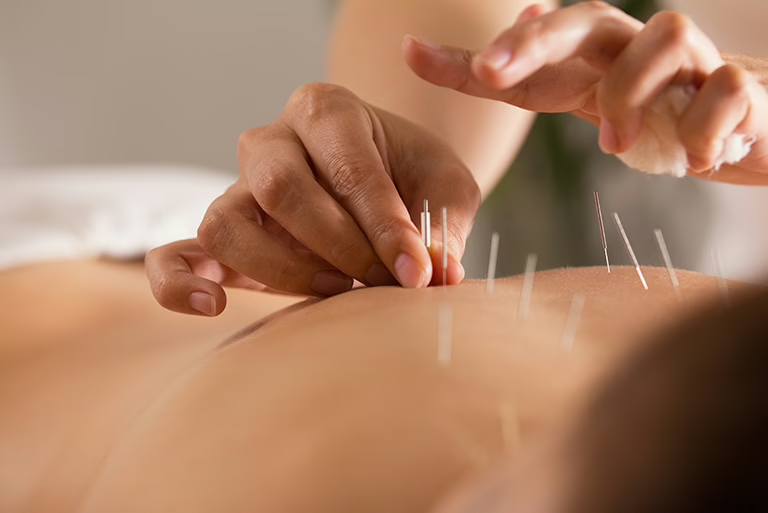
Improve your IVF success rate with Acupuncture Link copied! Infertility is more common than we think. Statistics have shown that 40% of married Singaporean couples who are actively trying for a baby are “not happy” with their progress. Many factors such as stress in our lives, our sedentary lifestyle, chemicals and toxins from our environment or the food we eat, may cause infertility. To help more couples fulfil their baby dreams, Oriental Remedies Group will be sharing a series of articles on fertility issues, for both male and female fertility. Whether you are: Trying to conceive naturally Going through assisted reproductive technology such as IUI Preparing or going through IVF, fresh or FET cycle We will share how TCM can be used to help condition the body for conception naturally and via assisted reproductive technology such as IUI and IVF. The path towards conception can be long and daunting and we hope to help educate and bring practical solutions for couples. For this specific article, we will look at how TCM can help the female during the IVF process. Fertility Series: Acupuncture for females during IVF What is IVF? In vitro fertilization (IVF) is a complex series of procedures used to help with fertility or prevent genetic problems and assist with the conception of a child. During IVF, mature eggs are collected from ovaries and fertilized by sperm in a laboratory. Then the fertilized egg (embryo) or eggs (embryos) are transferred to a uterus. One full cycle of IVF takes about three weeks. Sometimes these steps are split into different parts and the process can take longer. How can acupuncture help? Research has proven that TCM can help condition your body and therefore increase the success rates with IVF. This can be done through various ways such as through taking herbal medication and acupuncture. In this article, we will discuss how acupuncture complements IVF. 1) Effect on Ovarian Follicles Acupuncture has positive effects on ovarian follicles and assists in ovulation. Modern medicine believes that acupuncture helps to regulate the function of the hypothalamic-pituitary-ovarian axis system, which improves the secretion of various hormones such as the follicle-stimulating hormone, luteinizing hormone, estradiol, progesterone etc.[1]. This enhances ovulation in the individuals[2]. Farnoosh Bidouee’s study[3] on acupuncture in 120 infertile patients who received artificial insemination discovered that ovulation is improved after acupuncture. 2) Effect on Ovaries During IVF, follicular growth after ovulation induction is dependent on the blood supply of the ovaries. Studies [4][5] have shown that acupuncture in IVF patients increases the blood flow to the ovaries as compared to the placebo acupuncture group and control group. Therefore, acupuncture can improve the blood circulation in the ovaries and uterus, which helps to promote the growth and development of follicles. 3) Effect on Endometrial Receptivity Endometrial receptivity is a temporally unique sequence of factors that make the endometrium receptive to embryonic implantation. It is closely related to the success of implantation and pregnancy. Various conditions such as endometriosis, polycystic ovary syndrome and luteal insufficiency can affect endometrial receptivity. Zhong et al[6] has concluded that acupuncture is effective and safe to use in women with low endometrial receptivity, thereby increasing the chances of pregnancy. 4) Effect on Emotions IVF is a process that can be emotionally intense and stressful for the couple, especially so for the female who has to go through hormonal changes, side effects of drugs and potential complications of the medical treatment. The most common psychological challenges of infertile patients are depression and anxiety. These adverse emotions may be due to various factors such as high treatment cost, frequent blood draws, intramuscular injections, side effects of various complications etc. A number of studies [7][8] have shown that consecutive sessions of acupuncture from the day of injection of gonadotropin till HCG day, can reduce the excitability of the sympathetic nervous system, relieving negative emotions which aids in increasing the pregnancy rate. All couples who are preparing to start a family naturally or for those who are undergoing assisted reproductive technology, such as IUI and IVF can benefit from doing acupuncture to condition their bodies. What is the treatment schedule for acupuncture in IVF patients? Timing is essential during IVF and therefore there is also a recommended treatment schedule for acupuncture on IVF patients. The schedule is as below: Click to enlarge Your journey is the most important! In Oriental Remedies Group, we have more than 10 certified bi-lingual TCM Physicians. Each of them has been trained in both Nanyang Technological University (Singapore) and China for a minimum of 5-8 years, in both Biomedical Science and TCM before being certified to practice in Singapore. Specifically, we have Physician Poh who specializes in female fertility, gynaecological conditions and beauty. IVF is a procedure that takes time, effort and great determination. The chances of success if higher when the female further prepares her body for the procedure. With current research on how acupuncture complements IVF, we hope to be able to help more females trying for IVF. Do contact us at +65 8087 0486 for a personalized consultation to help you with your worries. Also, when it comes to fertility, it really does takes two hands to clap. The male partner who does his part to ensure that the sperm quality is optimal for use during IVF increases the couple’s chances. Do refer to our earlier article by male fertility expert, Physician Lim, to find out more about improving male fertility in order to improve quality of sperm – Improving Male Fertility Using Traditional Chinese Medicine (TCM). For those who wants to start a family naturally and wants to find out how you can prepare yourself and your partner, do also look out for our other articles on fertility. This article is written by Senior Physician Leong Weizhen, with contributions from Senior Therapist Hannie Hong. Leong Weizhen Chief Medical Officer, Lead Physician VIEW QUALIFICATIONS Upon graduation from NTU/BUCM with double degree in both Biomedical Science and TCM, Singaporean Physician Leong Weizhen was awarded the prestigious Chinese Government Scholarship (out of only seven places offered) for a 3-year Master’s course in BUCM and under the prestigious
Effectively Counter Ageing And Chronic Diseases With TCM
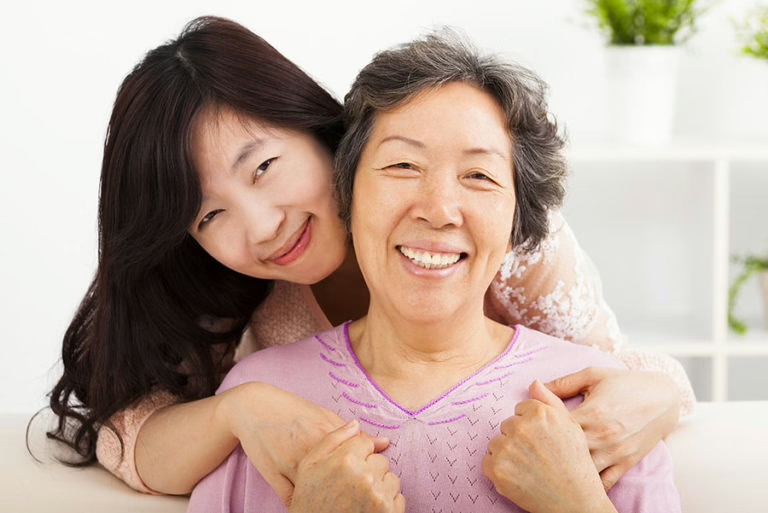
Effectively Counter Ageing And Chronic Diseases With TCM Link copied! Ageing is a natural, yet complex process that occurs in everyone. In the latest biomedical research, it is revealed that telomere length can be used as an indicator of a person’s biological age (which is different from chronological age). Research has shown that many factors – including exercise, sleep, emotional dysregulation and certain gene mutations – can reduce telomere length and result in premature biological ageing. An example would be a recent study which demonstrated that children who had lost their fathers had significantly shorter telomeres. According to ‘Shen Nong’, who is venerated as the Father of Chinese Medicine, the process of ageing typically begins after 35 years old and is characterized by a decline in bodily functions. From a TCM perspective, ageing is the process of losing kidney ‘qi’ and essence along the kidney meridian. The meridians are energy channels that allow qi to flow throughout the body. Similar to the concept of shortening telomeres, we believe that both internal and external factors contribute to ageing in TCM. What will I expect during the process of ageing and why is this a concern? Typically, once we reach the peak of our lives at the age of 28 and 32 years old respectively for females and males, our bodily functions gradually start to decline. Many people do not see this as a problem since everyone has to go through this phase. However, chronic diseases and conditions are on a rise worldwide and we now see an increasing trend of younger people having such conditions. This means that people are ageing ahead of their chronological age, due to a variety of reasons. There is a need to have preventive measures in place before the onset of such conditions and TCM treatments are getting more popular in the prevention and slowing down of disease progression. Some of the signs and symptoms that accompany the process of ageing include high blood sugar, high blood pressure, high cholesterol, decreased appetite, poor sleep, fatigue, incontinence, dizziness, gray hair, hair loss, fragile bones, etc. Although this is a natural process, the symptoms that accompany the ageing process can sometimes be very uncomfortable and at times, pose danger to our lives. If these signs and symptoms are not controlled well, they often develop into chronic diseases such as cardiovascular disease, chronic obstructive pulmonary disease (COPD) and stroke. The tendency to succumb to illnesses increases as age progresses due to a decrease in bodily functions, which in turn lowers immunity. A decline in mental ability during the process of ageing could potentially result in dementia or psychiatric disorders such as depression. What causes the development of ‘ageing’ diseases from a TCM perspective? From a TCM perspective, age-related changes are mainly due to organ degeneration and exhaustion of fundamental substances (from a functional aspect). [1] When there is an imbalance of the fundamental substances, pathological changes take place and disease progression occurs. 1) Exhaustion of fundamental substances The human body is made up of a continuous, dynamic system of fundamental substances such as qi, essence (jing), blood, body fluids and spirit (shen), that interact together to create the activities making up life. In the natural process of ageing, these substances gradually weaken and becomes depleted, slowing down bodily activities. This is reflected in the common signs of ageing, such as loss of hair, fragile bones, and gray hair. 2) Organ degeneration The kidneys store the essence of life and have the most important role in the process of ageing. With depletion in the essence, the kidneys main function of propelling life and maintaining physiological balances fails and hence leads to a decline in vitality. Another major organ that contributes to the process of ageing is the spleen, which is a manufacturer of qi, as well as a good storage place for qi. As we age, the function of the spleen in metabolizing nutrients decreases, and it is no longer able to ensure proper nourishment and replenishment of the body. The organs in our body become under-nourished and this contributes to various conditions such as fatigue, dizziness, loss of appetite and poor sleep. 3) Accumulation of metabolic wastes Environmental influences or lifestyle habits such as overeating, straining, inadequate exercise and stress contribute to the accumulation of metabolic wastes. As we age, the function of internal organs slow down and they can no longer remove metabolic wastes as effectively. In TCM, the San Jiao works to help remove metabolic waste and it is important to maintain its optimal function as we age. How do we help patients with chronic diseases here at Oriental Remedies Group? Fret not, as there is hope. Your biological age can be much younger than your chronological age with proper and timely intervention. Herbal Medication & Dietary Changes Herbal medication helps in countering chronic diseases by replenishing the fundamental substances. The active ingredients of herbs play a great part in the replenishment process. Herbs such as ginseng contains bio-active metabolites which help to increase lifespan and regulate the function of multiple organ systems, including the cardiovascular and nervous systems, through its antioxidant and anti-inflammatory properties. Another common herb, gouqi, has been reported to mediate significant anti-ageing effects through anti-oxidant, immunoregulative, and anti-apoptotic activities and reducing DNA damage. Acupuncture Acupuncture is the insertion of fine, thin needles through the skin at particular acupoints to help stimulate specific functions. Acupuncture typically increases blood circulation to the area, promotes elasticity of muscle fibers and improves muscular contractility. As such, it helps to stimulate collagen production, clear blockages, correct imbalances of Yin and Yang energy and promote self-healing of the body. Massaging certain acupoints also helps in removal of toxins to improve conditions such as high blood pressure and high cholesterol. Electro-Lymphatic Therapy (ELT) Electro-Lymphatic Drainage Therapy (ELT) is a gentle and non-invasive therapy that helps to stimulate proper flow and drainage of the lymphatic system, simulating the effects of a lymphatic drainage massage or tuina without the pain and pressure. ELT is performed using an FDA-registered wellness device to boost your overall wellness. Good lymphatic drainage helps with the removal of metabolic wastes, excess
An Integrative TCM Approach To Relieving Your Chronic Pain
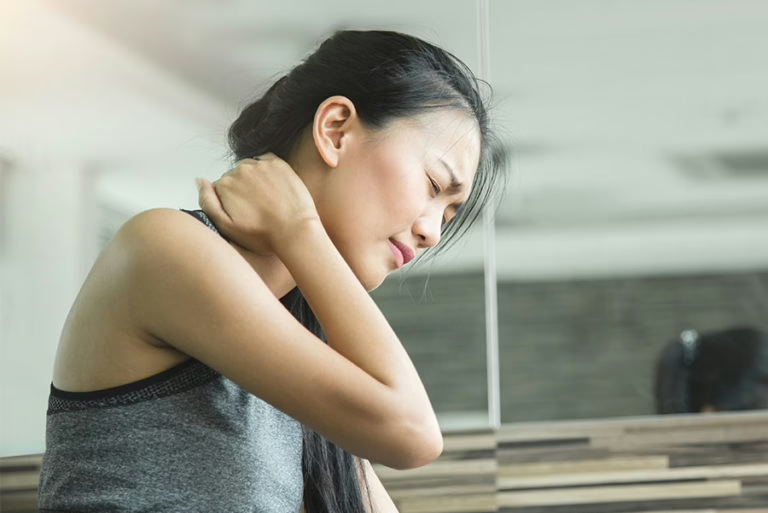
An Integrative TCM Approach To Relieving Your Chronic Pain Link copied! Are you suffering from chronic pain? Chronic pain is defined as pain that lasts or recurs for more than three months. It has been reported that chronic pain affects around 20% of people worldwide. While most people think chronic pain is something that only exists in elderly people, there is a rising trend of our younger population complaining of aches and pain that is persistent and recurrent. These aches and pains are commonly seen in our clinic with patients as young as 21 years old, some in the prime of their life (30s to 40s), and many who are our seniors of the Merdeka and Pioneer generation. Chronic pain is not gender-specific and non-biased. And while pain can occur in every part of the body, back pain is one of the more common issues that we see in our patients – research has shown that approximately 15% to 30% of adults suffer from back pain each year. [1][2] As the saying goes: Knowing is half the battle won. Knowing how chronic pain comes about and mitigating the aggravating factors goes a long way in the management of chronic pain. Depending on the age and type of condition, some can even rid themselves of their pain baggage with proper treatment and care. Traditional Chinese Medicine (TCM) has been backed by much research to be effective in pain management. For example, a National Institutes of Health study on chronic myofascial pain suggests that TCM is safe and frequently efficacious alone or subsequent to standard psycho-social interventions.[3] TCM is widely available and provides patients with an effective, natural form of pain relief therapy. The following list includes some medical conditions (not exhaustive) commonly associated with chronic pain: Headaches Sprains Joint pain/ Arthritis/ Arthralgia Neck and shoulder pain Back pain and sciatica Tennis elbow (Epicondylitis) Tightness and pain at the elbow and forearm can result in weakness when gripping Carpal Tunnel Syndrome Numbness/pain at the palm and first three and half fingers, with possible tightness and ache at forearm or muscle wastage in the palm if severe Mechanical back syndrome, Rotator cuff tendonitis Pain and ache at the neck, back and shoulders can vary among different individuals in area and severity Trigger finger, DeQuervain’s syndrome/Mother’s thumb Pain with difficulty when flexing or extending the finger joints; feeling as though fingers are ‘locked’ Fibromyalgia Post-operative pain Cancer pain Common causes of chronic pain and pain relief methods Below are some common causes and methods to relieve chronic musculoskeletal pain from both biomedical and TCM perspectives. 1) Repetitive strain This usually occurs due to repetitive movements and over-usage of muscles. You can sustain repetitive strain injury when at work, during exercise, doing housework (such as washing dishes, cooking or cleaning the floor), or even at rest (when bending your head down to look at your phone or play mobile games on your tablet). Some of the specific common pains due to repetitive strain include tennis elbow, carpal tunnel syndrome, trigger finger and ‘Mother’s thumb’. Besides taking pain killers, anti-inflammatory medicine and applying pain relief plasters, those who prefer a gentler, natural approach rather than steroid injections or surgeries achieve good results in their pain management with a combination of TCM and Tech-enhanced treatments – more information on Tech-enhanced treatments are shared below. 2) Poor posture and lack of exercise Due to many city dwellers’ sedentary and stressful lifestyles, we are often not just in a bad posture, but we are in it for prolonged periods because we are focused on other tasks at hand. When we move and exercise less, the disuse of our bodies leads to a deterioration of many bodily functions. Disuse syndrome has received much attention in relation to back pain problems, chronic pain disorders, and other illnesses. It has been generalized beyond chronic pain problems and some feel it is related to “the base of much human ill-being.” At work, office workers should always ensure that their sitting postures do not strain their neck, back and wrists. They should take short breaks at roughly 1-hour intervals to prevent stagnation in Qi and Blood, which can result in stiffness and aches. Additional attention should be made to avoid a forward head posture, which is the result of bending over and looking downwards too often (in the case of mobile phone usage). When sleeping, a good pillow of appropriate height and firmness should be used so that neck muscles are relaxed and that the cervical joints are well supported. Source: Fairfield Physiotherapy After a long day of sitting at your desk for work, try engaging in some back exercises that are good for back pain relief. These exercises relieve back muscle tightness, keeping them supple and reduces strain on the back. Do them daily and try to relax while you stretch – you should feel your body loosening and a sense of relief in your back muscles. Location Back exercise for pain relief Upper back Chin tuck Sit in a chair with your feet flat on the floor. Your shoulders should be relaxed and down. Now pull your chin in toward your neck. Count to five, then relax. Repeat 10 times. Chest and upper back stretch Clasp your hands behind your back or behind the back of your chair and stretch your chest forward. Slowly lift your head and stretch as far back as possible. Hold for at least 10 seconds. Repeat 5 times. Low back Low back twist Lie down on the ground. Bend your knees with both feet planted on the ground, hip-width apart.Drop your knees to the left as you turn your head to the right. Hold for 10 seconds.Then drop your knees to the right and turn your head to the left. Hold for 10 seconds. Repeat 5 times. 3) Energy blockages and exposure to pathogens From TCM perspective, the body is seen as a holistic whole. This means that pain is the body’s way of signalling a warning alarm.
Improving Male Fertility Using Traditional Chinese Medicine (TCM)
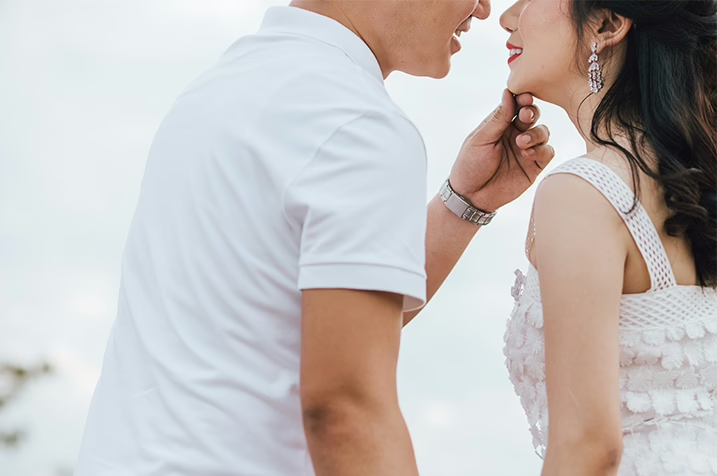
Improving Male Fertility Using Traditional Chinese Medicine (TCM) Link copied! If you and your spouse have been actively but unsuccessfully trying for a child, please know that you are definitely not alone. According to the World Health Organization (WHO), infertility will be the third most serious health condition after cancer and cardiovascular diseases plaguing humanity in the 21st century. About 40 per cent of married Singaporean couples who are actively trying for a baby are “not happy” with their progress, according to a recent survey on fertility health released in July 2019. While women traditionally bore the stigma of infertility and childlessness, the man’s role in infertility issues is gaining awareness. Recent statistics show that married couples experiencing infertility are due to problems arising from the male partner.1 While there is a lack of nationwide data regarding male reproductive health, doctors say rising male infertility rates here mirror the global phenomenon of declining sperm quality in the last 40 years. How is infertility defined? Infertility is defined as a failure to achieve a clinical pregnancy after 12 months or more of regular unprotected sexual intercourse. How can Oriental Remedies Group help men who are experiencing infertility issues? Note: All words in Italics refer to the TCM organ-system and not the anatomical organ referenced in western medicine. Step 1: Full analysis of the semen analysis report The first step to understanding male infertility involves making sense of the semen analysis report. According to the 5th edition of the WHO laboratory manual for the examination and processing of human semen, a normal semen sample should fulfil the parameters below: An example of a semen analysis report A sex hormone test (testosterone, estrogen, FSH, LH and prolactin levels) can be very helpful in providing the physician with baseline information about your endocrine health. This report combined with other findings mentioned above helps the physician determine the number of courses required for treatment. An example of a sex hormone test. Source: Reddit In a typical consult, our experienced physicians would encourage our patients to bring their past health reports especially any fertility test results for a holistic understanding of the couple’s health conditions. Step 2: Understand the root cause issues from a TCM perspective Male infertility can be due to many factors ranging from congenital factors, dietary habits, emotional extremes, external pathogenic factors, external injuries and maltreatment among various others. However, not every male exposed to the same external factors results in infertility. This can be attributed to the health of the individual’s Kidneys. With this understanding, modern eminent TCM andrologists like Professor Xu Fu Song(徐福松) and Wang Qi (王琦) have successfully treated numerous patients for many decades by combining continual research in TCM and use of scientific advances in semen analysis and endocrine testing. TCM believes that the Kidneys govern the pre-natal essence or Jing(精) in the human body. This pre-natal essence is what determines the quality of our reproductive ability to carry on the family line. Having said that, the quality of the Kidney essence depends largely on the surplus Qi(气) which our other organs produce. TCM handles male infertility by understanding if there are excess or deficiencies in the body. Tonifying deficiency and removing excess is a fundamental technique used to restore balance and harmony to the body. The semen analysis content is first divided into classifications of excess or deficiency. For example, when there is a diminished sperm concentration, it could signify a deficiency in the body resulting in Kidney deficiency. When the percentage of sperm with normal morphology is low, it usually signifies that there is an excess in pathogenic factors that have to be cleared in order to restore balance to the body. Other than the semen analysis, the sexual function of the male is also assessed as different symptoms of erectile dysfunction or premature ejaculation could provide clues as to which organs are not functioning optimally. Examples like erectile dysfunction during stressful periods is a signal of Liver Qi stagnation whereas premature ejaculation combined with frequent sweating alludes to Lung Qi deficiency. Step 3: Customised treatment approach at Oriental Remedies Group (ORG)? Because everyone is unique and lead dissimilar lifestyles, a one size fits all approach will be insufficient to manage this issue. Only a holistic approach taking into consideration all factors that result in poor fertility can TCM manage this condition. This means that not only will you regain your reproductive health, your general health will also see visible and perceptible improvement. Through our TCM diagnosis and observing how our body reacts to our diet, lifestyle and environment, we can empower you to make the right choices and tailor-make a treatment course most beneficial to your reproductive health. What are the treatments offered for fertility improvements? Herbal Medication Our experienced and well-trained physicians will go through with you your body condition, daily habits and so on to gain a better understanding about the root causes of the imbalances in your body. For example, if the root cause is due to spleen deficiency and dampness, the physicians may prescribe Bai Zhu, Fu Ling and Yi Yi Ren to tonify the Spleen and remove dampness. If the issues are more related to Kidney Yin deficiency, the physicians may use Gou qi zi, Shu Di Huang, Shan Zhu Yu to replenish Kidney Yin. As for damp-heat, Tu Fu Ling, Bi Xie and Che Qian Zi to clear heat and drain dampness. For infertility patients, common herbs that are prescribed to help boost the quality of sperm include Gou Qi Zi, Tu Si Zi, Wu Wei Zi, Fu Pen Zi and Che Qian Zi. These 5 herbs combine to form a decoction called Wu Zi Yan Zong Wan, the premier fertility decoction of ancient and modern times. However, the components of each infertility patient’s medication would differ based on the root cause(s) and deficiencies they may have. Acupuncture Acupuncture uses very fine needles into specific points along the meridians to correct the imbalances of the various organs. In one study regarding acupuncture and abnormal semen parameters, acupuncture was used to stimulate 4 points on the body namely, BL23 (Shen Shu), ST36 (Zu San Li), CV1 (Hui Yin) and CV4 (Guan Yuan). A placebo control group together with a blank control group were included in the study. The researchers found that the patients who underwent the acupuncture
Chinese Four Herbs Soup – Dessert Edition
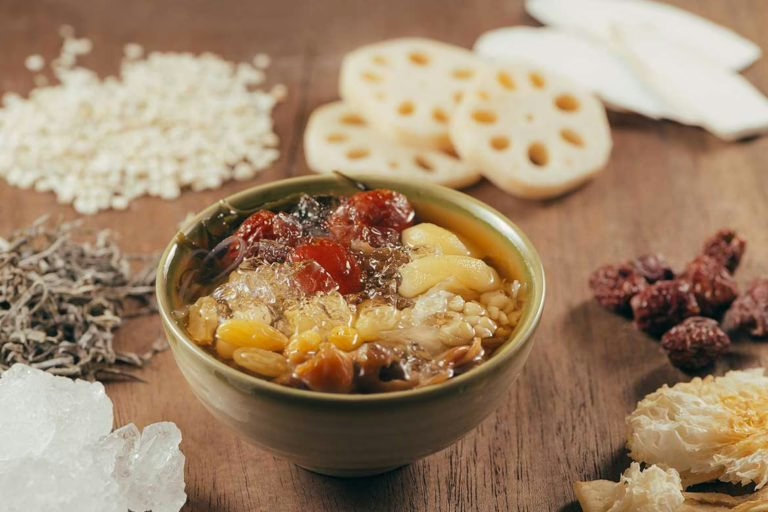
Link copied! Another common body constitution in Singapore is Qi Deficiency. This constitution greatly affects your immunity. To help, we have adapted a popular soup recipe for dessert to invigorate your Qi. But first, let’s look at some common indicators of Qi Deficiency: Often short of breath/fatigue, dizziness, feeble voice (esp. after exercising) Catch flu/cold easily, sinusitis, sensitive to environmental changes (weaker immune system) Palpitations, lower backaches, frequent urination, impotence or low libido. Pelvic Organ Prolapse (dropped bladder, bowel, rectum, uterus) Excessive sweating, teeth marks on the tongue, bloating especially after eating, sluggish bowel movements Qi Stagnation was a topic explored in one of our corporate talks from September 2019.To know more about our talks, kindly contact us. Recipe for Qi Invigorating Dessert Soup Four Herbs Dessert Soup An alternative take on theChinese Four Herbs Soup (Si Shen Tang 四神汤) Chinese Yam – Shan Yao 山药 23 grams Poria – Fu Ling 茯苓 30 grams Gordon Euryale Seeds – Qian Shi 芡实 30 grams Lotus seeds – Lian Zhi 莲子 30 grams Optional ingredients to make your soup tastier: Rock sugar Red dates Longan Gingko nuts White fungus Silky tofu skin Instructions Bring ingredients up to a boil in 1.5L to 2L of water. Lower heat and let simmer for at least 1 hr. Allow it to cool before serving. We recommend you serve it warm and with less sugar, opt for natural sweeteners like Red dates or Honey. Warm foods are also more beneficial than cold or iced options. Check out our Calming Tea recipe for Qi Stagnation here. Check out our nourishing meat and soup recipe here. Disclaimer: The content on this page is for information and educational purposes only. Such medical information may relate to disease, injury, drugs and other treatments, medical devices and/or health products. Medical information does not amount to advice, and if advice is needed an appropriate professional help should be sought. The disclaimer asserts that no warranties or representations are given in respect of the medical information, and that the website operator should not be held liable if a user suffers any injury or loss after relying upon the medical information. RELATED TOPICS YOU MIGHT ALSO LIKE